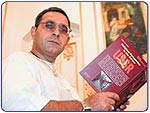Devotee Remembers KGB Persecution
By Sudeshna Banerjee | Сен 16, 2007

For 730 days, Gagik Buniatyan ate bread. So what? Well, for 730 days Buniatyan ate only bread, very coarse and just three slices. That was all that the 23-year-old was allowed while serving time in a Siberian labour camp, where temperatures dipped to negative 50 degrees Celsius.
Buniatyan was neither a killer, nor a thief, but for his faith, which, in the eyes of the Soviet Union’s secret police KGB, he says, was just as bad. As a vegetarian, bread was the only thing he could have. To make the bread go down, he put some salt on it to produce some saliva.
Buniatyan, an Iskcon devotee, is in Calcutta now. The 43-year-old from Armenia, known in Iskcon as Sarvabhavana Das, has written a book on his tryst with Krishna, and the KGB. The book is called Salted Bread.
If Iskcon was plagued by internal controversies in the US in the Eighties, in the USSR, KGB did not spare it either. The book says Buniatyan lost many teeth, had his vision impaired and was thrown into a madhouse. “The authorities at Sovetashen jail gave one of us, Advaita Das, an injection meant for the mentally disturbed. He said another shot could make him quit Hare Krishna. And he was one of our strongest members!”
Buniatyan’s closest friend, Sarkis Ohanjanian, died in prison. “Sako died 28 days before we were to be set free. His cellmate said he was suffering from tuberculosis. He was being refused milk and boiled potatoes though it was part of the hospital diet. The bread was often touched with fish. One day he requested his head to be shaved and took a bath. With toothpaste he put tilak on his forehead, wore the bedsheet as a dhoti, made japa beads from bread and a garland with newspaper. Then he sat in lotus position (padmasana). He died like that.”
So what did KGB see as the immediate provocation from Buniatyan and his friends? “We were distributing Iskcon literature, first in Armenia and then across Russia. Our only press was in Armenia.” This was perceived as a threat since Lenin had also caused a revolution aided by a printing press. In Armenia, there was another factor. “Armenians are proud of being the first nation to declare Christianity as a state religion.” Often people reported Hare Krishna hideouts to the police. “We would tear out pages from books by Lenin and Marx and put our material within the covers,” he chuckles.
With Gorbachev easing his stance against Iskcon in the early Nineties, things became easier. “When we joined there were barely 100 members across USSR. Today we have a hundred temples.” By then, Buniatyan had sought asylum from the UN and reached Calcutta. “I was here for seven years since 1991. How the city has changed!” Earlier taxi drivers would take on other passengers without his consent. “That doesn’t happen any more. And one in 10 people spoke English then. Now at least seven do.”
Before leaving Armenia, a dream had come true — he had distributed the first Bhagavat Gita in Armenian, printed in Germany. “The second instalment, weighing 30 tonnes, was burnt by the KGB.” Buniatyan is at ease in Bengal. “Here Communists go to temple,” a twinkle lights up his eyes.
Related Story: Book Release: Salted Bread















